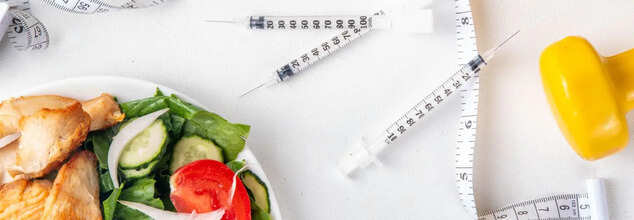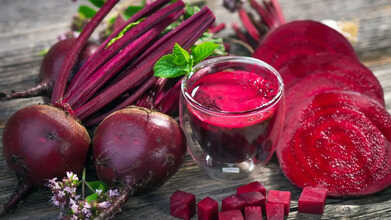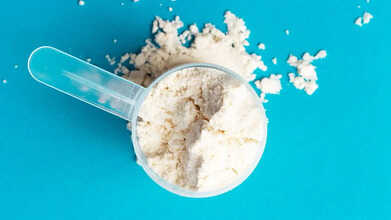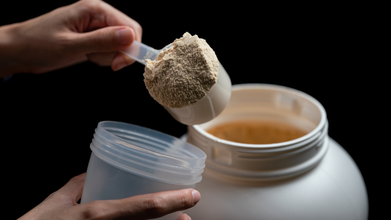- Health Conditions A-Z
- Health & Wellness
- Nutrition
- Fitness
- Health News
- Ayurveda
- Videos
- Medicine A-Z
- Parenting
- Web Stories
6 Natural Ozempic Alternatives That Can Help Quiet 'Food Noise'

Ozempic Alternative (Credit: Canva)
Have you ever found yourself constantly thinking about food, even when you’re not hungry? This persistent mental chatter about meals, snacks, or cravings is known as food noise. According to Dr. Raj Dasgupta, a physician who spoke with Healthline, food noise is the brain’s way of drawing attention back to food. It’s often linked to stress, emotional triggers, or an imbalance in the body’s hunger signals. While occasional food-related thoughts are normal, excessive food noise can interfere with your ability to focus on other aspects of life, making it challenging to maintain a balanced relationship with food.
In recent years, medications like GLP-1 drugs—such as Ozempic—have gained attention for their ability to quiet food noise. These drugs, primarily designed for managing diabetes, have an additional benefit: they help regulate hunger signals, making people feel full for longer periods. By reducing the intensity of food cravings and distracting thoughts, these medications can offer relief to individuals struggling with constant food noise.
However, relying solely on medication isn’t the only approach to addressing this issue. There are several effective strategies to manage food noise and cultivate a healthier connection with food.
Avoid Extreme Diets
One of the primary triggers of food noise is extreme dieting. Severely restricting calories or skipping meals might seem like a quick way to lose weight, but it often backfires. When the body is deprived of sufficient energy, hunger signals become more intense, amplifying the mental chatter about food. This heightened focus can lead to binge eating or feelings of guilt and frustration. Instead of adopting extreme diets, opt for balanced eating plans that provide adequate nutrition without leaving you feeling deprived.
Prioritize ProteinProtein is a powerhouse nutrient that can significantly reduce food noise. Foods rich in protein help stabilize blood sugar levels and keep hunger at bay for longer periods. Including protein-rich options like lentils, beans, tofu, and dairy in your meals can prevent sudden spikes and drops in energy that often trigger cravings. Moreover, protein promotes satiety, making it easier to focus on other tasks instead of constantly thinking about your next meal.
Understand Emotional Triggers
Food noise is often more than just physical hunger; emotional triggers play a substantial role. Stress, anxiety, or boredom can all increase the volume of food-related thoughts. Developing mindfulness practices such as meditation, journaling, or engaging in physical activity can help manage these emotions and reduce their influence on your eating habits.Focus on Small, Sustainable Changes
For many, addressing food noise isn’t about drastic overhauls but about gradual adjustments. Incorporating small habits, such as staying hydrated, eating regular meals, and listening to your body’s natural hunger and fullness cues, can make a big difference over time.While medications like Ozempic can offer relief, long-term management of food noise involves creating a sustainable balance between your physical and emotional needs. By combining mindful eating practices with nourishing food choices, you can effectively lower the volume of food noise and lead a healthier, more fulfilling life.
THIS Common Vegetable Juice Can Help Lower Your Blood Pressure Naturally

Credits: Canva
A common vegetable has been found to help reduce blood pressure in older adults, according to a new study. Beetroot juice can lower blood pressure in people aged 60 and above by targeting certain potentially harmful bacteria in the mouth. Researchers at the University of Exeter studied how younger and older adults responded to beetroot juice, which is rich in dietary nitrates. These nitrates are converted by the body into nitric oxide, a compound that relaxes and widens blood vessels, helping to lower blood pressure.
How the Study Tested Beetroot Juice on Younger and Older Adults
The study included 39 adults under the age of 30 and 36 adults in their 60s and 70s. For two weeks, each group received shots of beetroot juice. After a two-week break, during which participants used antiseptic mouthwash daily, they were given a placebo juice without nitrates for another two weeks.
Researchers analyzed the bacteria in participants’ mouths using gene sequencing. In both groups, the oral microbiome—the community of microorganisms in the mouth—changed after drinking nitrate-rich juice, though the effects were different depending on age. In older adults, there was a reduction in common bacteria that can sometimes cause infections and an increase in bacteria that support health. The older participants also showed lower blood pressure after two weeks of drinking the nitrate-rich juice.
Professor Andy Jones of the University of Exeter said, “This study shows that nitrate-rich foods can change the oral microbiome in ways that may reduce inflammation and lower blood pressure in older adults. This opens the door for larger studies to examine how lifestyle factors and biological sex affect responses to dietary nitrate supplements.”
Can A Person Drink Beet Juice While Taking Blood Pressure Medication?
It may be possible to drink beet juice while taking blood pressure medications. However, it’s important to consult a doctor before making any changes to a treatment plan for high blood pressure.
A doctor can advise whether combining beet juice with blood pressure medication could lower blood pressure too much. If this happens, a person may experience symptoms such as:
- Dizziness or lightheadedness
- Blurry vision
- Fainting
- Confusion
- Weakness or tiredness
- Headache
- Back or neck pain
- Heart palpitations
- Nausea
Low blood pressure (hypotension) can be serious. If someone experiences severe symptoms that do not improve when sitting or lying down, they should seek immediate medical attention.
Does Eating Beets Lower Blood Pressure?
Eating beets may help reduce blood pressure, but most research has focused on beet juice rather than whole beets.
Currently, there isn’t enough scientific evidence to confirm that eating beets has the same effect as drinking beet juice.
If someone wants to explore dietary changes to manage their blood pressure, it’s best to consult a doctor before making adjustments.
As Unsafe Levels of Lead Are Found in Protein Powders, Here Are Safer Alternatives You Can Switch To

Credits: Canva
Protein powder lead consumer reports: Some protein powders and shakes have been found to contain unsafe amounts of lead, according to a recent Consumer Reports investigation. The report, released Tuesday, analyzed 23 protein products, including dairy, beef, and plant-based supplements and revealed that over two-thirds contained more lead per serving than what experts consider safe, which is around 0.5 micrograms a day.
With growing concern over heavy metal contamination in protein powders, it’s worth exploring healthier, safer alternatives to meet your protein needs.
Protein Powders, Shakes Contain High Levels of Lead and Other Metals, Consumer Reports Finds
“Protein powders and shakes have become incredibly popular among people looking to add more protein to their diet,” said Brian Ronholm, director of food policy at Consumer Reports, in a news release. “Our tests found that toxic heavy metal contamination in protein supplements is widespread and has worsened since we first examined these products 15 years ago.”
According to the findings, plant-based protein powders had the highest levels of lead, averaging about nine times more than dairy-based options like whey and twice as much as beef-based products.
Among the products tested, Naked Nutrition’s Vegan Mass Gainer and Huel’s Black Edition were identified as containing the highest levels of lead and were listed under “products to avoid.” The full list of tested brands is available in the report.
Protein Powder Lead Consumer Reports: Alternatives To Protein Powder And Health Supplements
Andrew Mock, MD, MPH, a preventive and lifestyle medicine specialist at Loma Linda University Health and also California’s Strongest Man says the flood of protein products in the fitness market can often lead people to spend large sums on items that may not be beneficial, necessary, or even safe.
“For a non-active adult, about 0.8 grams of protein per kilogram of body weight is enough to prevent deficiency,” Mock explains. “For those who exercise regularly, the target should be 1.2 to 1.6 grams per kilogram daily. Higher amounts can be safe, but most people don’t actually need that much.”
Although protein shakes are convenient, nearly half of Americans (46%) drink them regularly Mock notes that they are not essential.
“You can easily meet your protein needs with regular food,” he says. “Protein powders and ready-to-drink shakes are helpful for busy days, but they shouldn’t be treated as dietary must-haves.”
Whole food protein sources include:
- Eggs
- Fish such as salmon, tuna, and cod
- Greek yogurt
- Cottage cheese
- Milk
- Beans like black, kidney, and lentils
- Chickpeas
- Tofu
- Quinoa
- Chia seeds
- Flaxseeds
- Nut butters such as peanut, almond, or cashew
When time allows, homemade protein shakes made with natural ingredients are another safe and nutritious choice.
What Safe Supplements Should You Take?
While supplement companies are required to register with the U.S. Food and Drug Administration (FDA), the agency doesn’t routinely test their products. This lack of regular oversight raises safety issues, including contamination.
“It’s surprisingly common for even well-known supplement brands to contain harmful ingredients,” Mock warns. “These can include heavy metals, anabolic steroids, or other banned substances. One study even found that one in eight supplements contained illicit materials.”
Contamination has been detected across various products, from protein powders and multivitamins to herbal capsules with some not even containing what their labels promise.
To reduce these risks, Mock advises checking packaging for third-party testing certifications, which confirm that a product meets strict safety standards.
“Look for labels such as the National Science Foundation (NSF) mark, or certifications like Informed for Sport and Certified for Sport,” he says. “Another key label is current Good Manufacturing Practice (cGMP), which means the supplement is produced under proper safety and hygiene conditions monitored by the FDA.”
These certifications offer a level of reassurance that a supplement has been independently tested and verified. By checking for them, consumers can make smarter and safer choices when buying protein powders or other health products.
High Levels Of Lead Found In Protein Powders And Shakes, Reveals Consumer Reports

Credits: Canva
Consumer Reports Protein Powder: The Consumer Reports Protein Powder Investigation, titled 'Protein Powders and Shakes Contain High Levels of Lead', revealed, as the name suggests that some of the most popular and widely known protein powder were found with leads and other metal contents. The report was published on Tuesday, which analyzed 23 protein powder and shakes. The range included dairy, beef and plant-based protein supplements. The analysis found that more than two-thirds of the products contained more lead in a single serving than what experts consider to be safe, around 0.5 micrograms per day.
Also Read: Is Huntington’s Disease Genetic? Here’s Everything You Should Know
Brian Ronholm, director of food policy at Consumer Reports in a news release said, "Protein powders and shakes have become immensely popular and are part of a daily routine for many people who are focused on consuming more protein in their diet. Protein powders and shakes have become immensely popular and are part of a daily routine for many people who are focused on consuming more protein in their diet."
Lead Levels, Which Protein Powder Has The Most?
On average, the lead levels in plant-based products were the highest. The report revealed that it was nine times the amount found in dairy-based proteins, like whey. When compared to beef-based products, the plant-based powders had twice as much lead in it.
The Consumer Reports also published a list of products to avoid, among them, at the top were two plant-based protein powders by the brand Naked Nutrition Vegan Mass Gainer and Huel Black Edition. The former one contained 1,572% more lead than the level approved, while the latter one contained 1,288% over the approved level. The Consumer Report suggested that these powders should not be consumed at all, while for other products, it did provide the servings per week limit.
The categories are:
- Products to Avoid
- Recommend Limiting to Once a Week
- Okay to Eat Occasionally
- Better Choices for Daily Consumption
The Consumer Reports provided that Muscle Tech Mass Gainer showed no lead in its product, thus no limit was placed on it.
Consumer Reports Protein Powder: How Was The Test Conducted?
The Consumer Reports in its report writes that they purchased multiple samples of each product, including two to four distinct lots, over a three-month period beginning last November. These products were brought anonymously from online retailers and food stores. The samples from multiple lot were tested for levels of protein, arsenic, cadmium, lead, and other elements. However the report notes: "the results are based on an average of these samples, which were collected over a specific period of time, they may not mirror current contaminant levels in every product. Even so, the findings highlight why consumers should carefully consider the role of protein powders and shakes in their diet."
How Did The Protein Powder Companies Respond?
7 of the 23 companies did not respond for comments, but those who responded said that lead is a naturally occurring element that is difficult to avoid, especially in plant-based products. Eight companies, namely: Equip Foods, Garden of Life, KOS, Momentous, Muscle Meds, Muscle Tech, Orgain, and Vega, said they test both their ingredients and finished products for heavy metals.
© 2024 Bennett, Coleman & Company Limited

